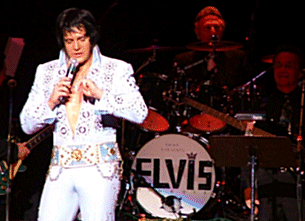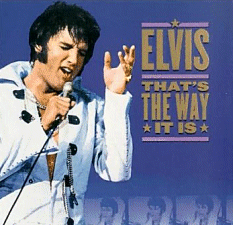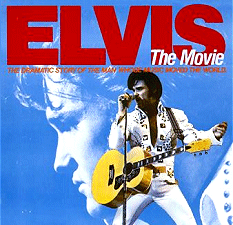Sixties
City presents
a wide-ranging series of
articles on all aspects of the Sixties, penned by the creator of the iconic
60s music paper Mersey
Beat
|
Sixties
City presents
a wide-ranging series of
articles on all aspects of the Sixties, penned by the creator of the iconic
60s music paper Mersey
Beat
|
|||||
|
 |
This
second documentary featuring Elvis was produced by Pierre Addidge and directed
by Robert Abel, who were to say, "Elvis was guarded at first. He's a very
private and, in some ways, shy person. The candid interviews with Elvis
were used as the narrative thread throughout this documentary, with Elvis'
voice heard over footage of his concerts and family stills. It also includes
footage from his early career, such as his debut on ‘The Ed Sullivan Show’."
The 93-minute concert film, which was first known as ‘Standing Room Only’, went on general release in America on 1st November 1972 and focussed on his 15-city tour in the spring of 1971 which began in Buffalo, New York, and ended in Albuquerque, New Mexico. In some areas it was shown on a bill with ‘Elvis – That’s The Way It Is.’ Excluding Elvis’ million dollar fee, the movie cost $600,000 to make and proved to be successful financially, being said to have recouped its costs after only three days of release. The documentary was nominated for a Golden Globe as Best Documentary of 1972 – and won it. Elvis was watching the ceremony on television in his bathroom at the Las Vegas Hilton and his friends in the other room heard him shout out, “My God! Sonofabitch! We’ve won! We’ve won the Golden Globe!” The Metro Goldwyn Mayer film was photographed by Robert Thomas and featured a montage supervised by Martin Scorsese. Elvis’s ‘Memphis Mafia’ and his father were included in the credits as Elvis' Assistants; Vernon Presley, Joe Esposito, Jerry Schilling, Sonny West, Red West, James Caughley, Lamar Fike, Marvin Gamble. The musicians with Elvis were: James Burton, Charlie Hodge, Ronnie Tutt, Glen Hardin, Jerry Scheff and John Wilkinson. The Orchestra was conducted by Joe Guercio and the background vocals were by Kathy Westmoreland, The Sweet Inspirations and J.D. Sumner and the Stamps Quartet. The opening act was Jackie Kahane. A soundtrack album of the movie was planned, but never released. |
|
‘Johnny B. Goode’ (penned by Chuck Berry which was played over the opening
credits) ‘See See Rider’ (written by Ma Rainey and Chuck Willis) ‘Polk Salad Annie’ (written by Tony Joe White) ‘Separate Ways’ (written by Red West and Richard Mainegra) ‘Proud Mary’ (written by John Fogerty) 'Never Been To Spain' (written by Hoyt Axton) 'Burning Love’ (written by Dennis Linde) ‘That’s All Right, Mama’ (written by Arthur Crudup) 'Lead Me, Guide Me' (written by Doris Askers, a spiritual performed during a rehearsal) ‘Bosom of Abraham’ (written by William Johnson, George McFadden and Ted Brooks) ‘Love Me Tender’ (written by Elvis Presley and Ken Darby) 'Until It’s Time for You To Go’ (written by Buffy Sainte Marie) ‘Suspicious Minds’ (written by Mark James) ‘I, John’ (written by Johnson, McFadden) 'Bridge Over Troubled Water’ (written by Paul Simon & Art Garfunkel) 'Funny How Time Slips Away’ (written by Willie Nelson) 'An American Trilogy' (This was a traditional number, arranged by Mickey Newbury, and was a combination of ‘Dixie’, ‘All My Trials’ and ‘Battle Hymn Of The Republic’. It became a trademark of Elvis' shows) ‘Mystery Train’ (written by Sam Philips and Junior Parker) 'I Got A Woman'/'Amen' (‘I Got A Woman’ by Ray Charles - ‘Amen’ by John W. Pate Sr. and Curtis Mayfield and usually performed as a medley at the end of ‘I Got A Woman’) ‘A Big Hunk O’ Love’ (written by Sid Wyche and Aaron Schroeder) ‘You Gave Me A Mountain’ (written by Marty Robbins) ‘Lawdy Miss Clawdy’ (written by Lloyd Price) ‘Can’t Help Falling In Love’ (written by Hugo Peretti, Luigi Creatore and George Weiss) ‘Memories’ (written by Scott Davis and Billy Strange - and played over the closing credits) ‘Lighthouse’ (sung by J.D.Sumner and the Stamps Quartet) 'Sweet Sweet Spirit' (sung by J.D.Sumner and the Stamps Quartet) ‘Don’t Be Cruel’ (written by Otis Blackwell, it was featured as a TV clip) ‘Ready Teddy’ (written Robert Blackwell and John Marascalo) This was Elvis’s 33rd and final movie and ends with the words from the compere: “Elvis has left the building” |
|
 |
An MGM
film in Panavision and Metrocolour, directed by Denis Sanders, produced
by Herbert F. Soklow and photographed by Lucian Ballard, it was released
in America on 11th November 1970. The feature, filmed during the singers'
third season in Las Vegas, had Colonel Tom Parker as technical adviser and
was Elvis' 32nd film, its length over the years varying from 97 minutes
to108 minutes. With a working title of 'Elvis', this was a documentary of
his first concert tour in thirteen years, filmed mainly at the Showroom
Internationale in Las Vegas' International Hilton Hotel and in Phoenix at
The Veterans Memorial Coliseum. Following a decade of lacklustre movies, Elvis began to regain his popularity with his live appearances and Colonel Parker decided to capitalise on this new surge of interest by organising a closed-circuit television broadcast, such as those used for heavyweight boxing matches. This eventually turned into the idea of a straightforward documentary which resulted in a huge amount of footage of several rehearsals and six complete Las Vegas concerts. Editing it down to the length of approximately an hour and a half brought problems as the documentary should have focussed completely on Elvis, his band and their performances, but there were too many interviews included in the initial release. However, the rock documentary was re-edited on its 2001 release with more emphasis on the music, with four additional songs and the interviews with fans and members of the hotel staff excised. One of the enthusiasts waiting in the queue to see the show was a 100 year-old lady who was taken inside for a personal meeting with Elvis. Among the celebrities who were greeted as they entered the International Hotel were Juliet Prowse, Dale Robertson and Xavier Cugat while Cary Grant and Sammy Davis Jr. were seen seated at tables. Looking visually splendid in costumes designed by Bill Belew, Elvis delivered a 1970 cabaret-style performance, with the songs taken from six of his performances. His voice is heard over the credits on the numbers 'Mystery Train' and 'Tiger Man'. In rehearsals at MGM he sings: 'Words', 'The Next Step Is Love', 'Polk Salad Annie', 'Crying Time', 'That's All Right (Mama)', 'Little Sister', 'What'd I Say', 'Stranger In The Crowd', 'How The Web Was Woven' (during which Elvis played the piano), 'I Just Can't Help Believing' and 'You Don't Have To Say You Love Me'. He is next seen in rehearsal with vocals groups, performing: 'You Don't Have To Say You Love Me', 'Mary In The Morning' and 'Polk Salad Annie'. |
| During further rehearsals
at the International Hilton he sings: 'You've Lost That Lovin' Feeling',
'Mary In The Morning' and 'Polk Salad Annie'. He then performs before an
audience at the hotel: 'That's All Right (Mama)', 'I've Lost You', 'Patch
It Up', 'Love Me Tender', 'You've Lost That Lovin' Feeling', 'Sweet Caroline',
'I Just Can't Help Believing', 'Little Sister' / 'Get Back', 'Bridge Over
Troubled Water', 'Heartbreak Hotel', 'One Night', 'Blue Suede Shoes', 'All
Shook Up', 'Polk Salad Annie', 'Suspicious Minds' and 'Can't Help Falling
In Love'. Backing was provided by musicians James Burton, ex-'Crickets' Glen Hardin, Charlie Hodge, Jerry Scheff, Ronnie Tutt and John Wilkinson while the background vocalists were Millie Kirkham, The Sweet Inspirations and The Imperials. In addition to the backstage scenes and chatter, there were a number of interviews with enthusiastic fans who ranged from businessmen to housewives. Elvis' dialogue with the audience indicated a sense of humour with comments such as "If the songs don't go over, we can do a medley of costumes". While he's singing 'Little Sister' he gets a shock off the microphone and says, "Son of a bitch!" He continues singing but is shocked again and says, "Shocked the hell out of me". At one point Elvis pauses to exclaim: "I need another pair of pants". Charlie Hodge laughs and says, "You didn't" and Elvis replies, "I busted the seat out of my pants, man". Chatting to the audience, Elvis recalls, "You know, when I first started in this business I was a little, bitty guy with a shaky leg. So, Ed Sullivan saw me and said, "Mmm, son of a bitch!" Anyway, they put me on TV and filmed me from the waist up. You know, I'm going…" and he shakes from the waist up! At one point he walks through the audience singing 'Love Me Do', offering kisses to his female fans who have their adoring eyes fixed on him. |
 |
'Elvis'
was a Dick Clark film which was originally screened in America on ABC TV
on 11th February 1979 as a three-hour television movie. It was then issued
as a theatrical feature in European cinemas, and is now often referred to
as 'Elvis - the Movie.' The original television screening was 171 minutes
in length, although various DVD versions have a variety of different lengths,
most of them using the two-hour European theatrical version. It was directed by John Carpenter (Elvis played a character called John Carpenter in his last feature film 'A Change of Habit') with a screenplay by Anthony Lawrence, who had previously scripted three Elvis movies: 'Roustabout', 'Paradise, Hawaiian Style' and 'Easy Come, Easy Go'. Consultants to the film included Sam Phillips, Kathy Westmoreland, The Jordanaires, Marty Lacker and Billy Smith while Priscilla was paid $50,000 to check the script for its accuracy. All the songs in the movie were sung by country singer Ronnie McDowell, who recorded 36 numbers for the film, although only 25 were used: 'Mystery Train', 'Good Rockin' Tonight', 'Old Shep', 'My Happiness', 'That's All Right (Mama)', 'Blue Moon of Kentucky', 'Lawdy Miss Clawdy', 'Blue Moon', 'Tutti Frutti', 'Long Tall Sally', 'Heartbreak Hotel', 'Rip It Up', 'Unchained Melody', '(Now And Then) There's A Fool Such As I', 'Crying in the Chapel', 'Pledging My Love', 'Until It's Time For You To Go', 'Bosom of Abraham', 'Suspicious Minds', 'Are You Lonesome Tonight', 'Sweet Caroline', 'Blue Suede Shoes', 'The Wonder of You', 'Burning Love' and 'An American Trilogy'. The film opened with a scene of Elvis at the International Hotel on 26th July 1969, when he was due to return to touring with his Las Vegas comeback show, although there were hints of a death threat on opening night. As Elvis sits in the room his memory flashes back to Tupelo, Mississippi, in 1945. He recalls his early teenage years and rebellious youth at Humes High School and the love of his mother, a job as a $35 a week truck driver, his discovery by Sam Phillips of Sun Records, his rise to fame, his stint in the army, his marriage to Priscilla and his frustration with his movie career - and the film ends in 1970, seven years before his death. This all presents a sanitised version of his life, no hint of a drug addiction or his romances with anyone other than Priscilla. Enthusiastic Elvis fans also complained about the numerous inaccuracies in the movie. Kurt Russell portrayed Elvis. |
|
Article
Text
UK
web hosting by
|